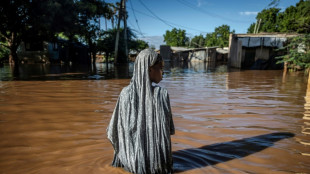

G7 urged to be 'bold' in climate hotspot Italy
G7 environment ministers gathered in Turin on Monday for two days of talks, as the UN warned "excuses" for failing to take bold actions on climate change were "not acceptable".
The Group of Seven meeting in the northern Italian city is the first big political session since the world pledged at the UN's COP28 climate summit in December to transition away from coal, oil and gas.
UN climate chief Simon Stiell kicked off the talks by urging the highly industrialised countries to use their political clout, wealth and technologies to end fossil fuel use.
"I often hear in forums like this one that, 'we cannot possibly move too far forward, lest we predetermine the outcome of negotiations'" at the UN level, Stiell told the ministers.
"It is utter nonsense to claim the G7 cannot -- or should not -- lead the way on bolder climate actions," said Stiell, who leads the United Nations climate change organisation.
The talks come as a new report by a global climate institute shows the G7 -- which includes Canada, France, Germany, Italy, Japan, the UK and the US -- is falling far short of its targets.
Hundreds of protesters demonstrated in Turin on Sunday, some burning photos of the G7 leaders who they accused of failing future generations over the climate crisis.
Environmentalists want to know how the ministers intend to follow through on pledges, such as the agreement at COP28 in Dubai to double energy efficiency rates and triple renewable capacity by 2030.
They also want a bold deadline on ending fossil fuel use.
France is expected to push for the G7 to phase out coal by 2030, but Japan is reluctant to set a date.
Germany -- Europe's biggest emitter of greenhouse gases -- is unwilling to wean itself off gas, as is Italy.
- 'Quantum leap' -
Rome, which holds the G7 rotating presidency this year, says it wants Turin to be "a strategic link" between last year's UN climate talks and COP29, which will take place in November in Azerbaijan.
Italy, a climate change hotspot vulnerable to wildfires, drought and glacier retreat, is putting "biodiversity, ecosystems, warming seas" high on the agenda, according to Italian Environment and Energy Security Minister Gilberto Pichetto Fratin.
Ministers are discussing "renewables, energy efficiency, phasing out fossil fuels" as well as "research for next-generation nuclear power, fusion, the circular economy, critical raw materials, biofuels," he said Monday.
The talks will stress the need to diversify sources of critical materials key to renewable energy systems, as well as minerals reuse, in a bid to stop overreliance on China, which dominates in green technologies.
Canada, France, Germany and the UK are pushing for a global treaty to reduce plastics pollution, and are expected to use the G7 to rally a reluctant US and Japan.
Together the G7 makes up around 38 percent of the global economy and was responsible for 21 percent of total greenhouse gas emissions in 2021, according to the Climate Analytics policy institute.
Not one member of the group is on track to meet existing emission reduction targets for 2030, on track instead to cut them by "at best around half of what is needed", a report by the institute said last week.
Climate watchers hope for a ramping up of support for less developed countries in decarbonising their industrial production, with experts advising on particularly tricky sectors, like cement and steel.
There may be commitments on more funds for adaptation to climate change, and Italy said the G7 would discuss "innovative" financing models amid calls for more accessible finance for vulnerable countries.
The UN's Stiell said the G7 needed to see "a quantum leap in climate finance as core business".
"'Challenging budget conditions' is not an acceptable excuse for failing to deliver substantial new public climate finance pledges," he told the ministers.
L.Amato--IM




